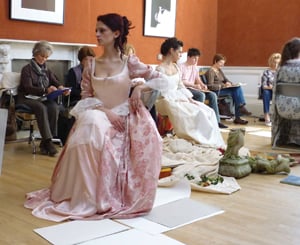
As the national fundraising charity for art, the Art Fund works to enrich the range and quality of art on public display in the UK by helping museums to buy, show and share art – something it has been doing for well over a hundred years. Throughout all of that time volunteers have been at the centre of its work, initially operating mostly outside London because as an organisation with a truly national reach, local supporters were historically needed to assist with acquisitions across the country.
And today is not so different. With a head office based in London, around 80,000 Art Fund members across the UK, and over 200 museums and galleries a part of the National Art Pass network offering free or reduced price entry, having pairs of hands close to the action is essential and our volunteers provide a valuable additional resource. They support the Art Fund in many ways – from fundraising, raising awareness and recruiting supporters, to organising a year-round programme of events including talks and study days, private views and special visits. Over the past five years they have organised more than 2,700 special events and visits raising more than £1.5 million to support our work. These events provide important opportunities for members and supporters to get together and make the most of the wonderful art on offer across the UK.
As belts are tightened and national and local funding for acquisitions is cut, the network has an increasingly important role to play in galvanising local support for our fundraising campaigns for specific works of art. Recently they have helped raise funds towards major national campaigns such as securing the Staffordshire Hoard for the West Midlands and Brueghel the Younger’s ‘The Procession to Calvary’ for the National Trust’s Nostell Priory in Yorkshire. They also played a major role in the success of the Art Fund’s first match-funding appeal which secured the Frome Hoard of Roman coins for the Museum of Somerset – bringing in £10,000 from members of the public.
Over a decade ago we began developing the network to ensure that we were complying with new legislation and and promoting best practice in volunteer management. The result was the new formalised regional structure we have today, and a tailored guide for volunteers with all the information they need to ensure that their volunteering is carried out to the best possible standards and in keeping with our core aims as an organisation.
Today, the majority of the 600 volunteers are based throughout 64 regional committees, broadly reflecting UK counties, and are led by volunteer representatives. These committees each form part of a wider regional team – there are 12 in total – led by an experienced volunteer regional chair who has a key role in supporting, energising and developing volunteers within their region; supporting committee recruitment; and planning and working with head office to identify local training needs. The regional chairs also act as a sounding board, advising the head office team on volunteering strategy.
Twice-yearly regional meetings provide an opportunity for volunteers to get together and share ideas and best practice, and for head office and regional chairs to update on developments and to cohere around common goals. These meetings also provide a forum for training and workshops tailored to the specific needs of the region. An annual volunteers’ conference provides an important opportunity to share strategy and celebrate success. Here our volunteers take centre stage, sharing their achievements, expertise and challenges with colleagues from across the country. This best practice informs case studies and toolkits available to the wider network via our online resource for volunteers.
With the Art Fund’s new four year strategy in place, including our commitment to increase charitable spend from £4.5million to £7million by 2014, we are working closely with our volunteers to ensure that we’re supporting them as best we can. Together, we support museums and galleries in building thriving collections, and help their visitors make the most of the them – all across the UK.
Join the Discussion
You must be logged in to post a comment.